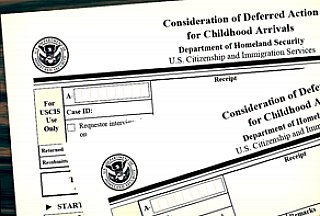
Media outlets are reporting that conservative talk radio host and pundit Rush Limbaugh has stated his support for granting "Dreamers" citizenship through amnesty, provided that they will not be allowed to vote for 15 to 25 years.
That is a singularly bad idea.
I have in any number of writings and blog postings questioned the wisdom of serial amnesties because I believe that the costs outweigh the benefits, notwithstanding the humanitarian urge to do so where young people are concerned.
I believe that the amnesty will inevitably result in rewarding the parents who had their children smuggled, at great risk (and sometimes great harm), and therefore result in even more parents taking that path, leading to the "need" for another amnesty in a decade or so. This is egregiously irresponsible for a nation that purports to be concerned over the vulnerability of children, and so adamantly opposed to alien smuggling and trafficking.
Amnesties only encourage more of the same. By way of proof, we need only look at last year's border apprehension statistics: Nearly half of those taken into custody were minors and family units. Can anyone doubt that even the mention of an amnesty has hastened this flood of the most vulnerable attempting to illegally cross our nation's borders?
Now imagine what will happen when word gets out that at least one of the bills recently introduced in the Senate would have prospectively granted a de facto amnesty through statutory "deprioritization" of any alien arriving prior to June of this year — presumably after passage of the bill into law.
In important ways, it matters little that the bill didn't pass, because it heightens expectations, which is the hope that nurtures illegal crossings.
But getting back to Limbaugh: I understand the wellspring of his remarks — to be sure that these individuals can't be used by pawns of the Democratic Party machine, which has gone so far as to actually put into writing their expectations that the fatter the amnesty, the better their polling chances in future elections.
Even so, it's a bad, indeed dreadful idea, particularly given our nation's checkered history. I never conflate illegal immigration and civil rights issues — they're nothing alike — but I do think that the idea of second-class citizens is anathema to our republic. The answer isn't to withhold the right to vote; I don't even think a law of this sort would pass constitutional muster.
If that's the route that needs to be taken in pursuit of an amnesty, in order to ensure that it doesn't simply satisfy the baser political instincts of one party or the other, then the proper path is simply to legislate an extended period of time before an amnestied alien is entitled to file for naturalization.
This is easily accomplished through statute, by:
- Providing that the conditions for granting amnesty aren't so generous as to forgive aliens convicted of multiple misdemeanors (some of the bills allowed up to three, provided they weren't for "serious" or "significant" crimes, whatever those terms are intended to imply).
- Requiring a period of conditional residence of perhaps three years, upon the grant of amnesty. This time frame of conditional residence has the added benefit of permitting post-grant vetting and audits that permit adjudicators to be sure that fraud wasn't perpetrated in the initial grant, and it also acts as a probationary period to determine if those granted are going to end up falling afoul of the nation' criminal laws.
- Establishing that if the amnestied alien passes the requisite three-year conditional residence period, then he or she will be granted permanent resident status.
- Not permitting applications for naturalization from this group until after at least 10 years of lawful permanent residence.
In this way, an alien who is the happy beneficiary of amnesty would have spent a total of 13 years in some form of resident status prior to making application — and, given the usual backlogs attending to naturalization applicants, will likely spend at least two more in the queue waiting for the actual oath of citizenship to be administered.
This is no small amount of time to ensure that amnestied aliens have acculturated and assimilated into our society and become responsible members of their respective communities. It also permits the government to weed out those who prove to be criminals or fraudsters or even, heaven forbid, worse.
Most importantly, it preserves the important political and philosophical ideal that, with the exception of holding the presidency, which is preserved by the Constitution for those born in the country, there is no difference in the worth of our citizens, whether native-born, derivative, or naturalized.
